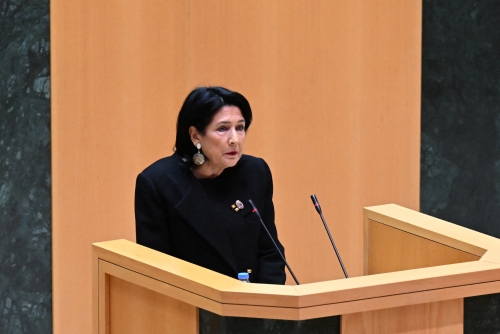Protests in Georgia as MPs proceed with controversial 'foreign influence' law
AFP | Tbilisi
The Daily Tribune – www.newsofbahrain.com
Georgia's parliament was poised to advance Wednesday with a controversial "foreign influence" law that has sparked mass street protests over concerns it would undermine Tbilisi's European aspirations.
The bill, which is expected to pass a first reading, has been criticised as mirroring a repressive Russian law on "foreign agents" used there to silence dissent.
Thousands took to the streets to protest against the law on Monday and Tuesday.
In chaotic scenes past midnight, Georgian riot police chased demonstrators in the labyrinth of narrow streets near parliament, beating them and making arrests, AFP saw.
Several local media outlets said police had attacked their journalists.
Another mass protest is scheduled for Wednesday evening.
If adopted, the bill would require any independent NGO and media organisation receiving receives more than 20 percent of funding from abroad to register as an "organisation pursuing the interests of a foreign power."
It has sparked a backlash both inside Georgia and in the West.
A similar bill targeting "foreign agents" was dropped last year after mass protests outside the parliament building in Tbilisi.
The turmoil comes ahead of crucial parliamentary elections in October, seen as a key democratic test for the Black Sea country.
The bill will also need to pass subsequent votes in the second and third readings -- and override a highly likely presidential veto.
Georgian President Salome Zurabishvili -- who is at loggerheads with the ruling party -- said the measure contradicted "the will of the population" and denounced it as "a Russian strategy of destabilisation".
Parliament Speaker Shalva Papuashvili insisted the initiative was about boosting transparency and said it would not damage Tbilisi's bid for EU membership.
But European Council President Charles Michel said the law "will bring Georgia further away from the EU and not closer".
Washington has also expressed concerns.
Related Posts

